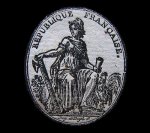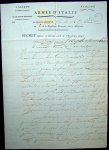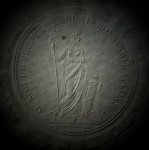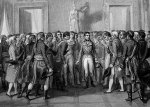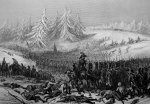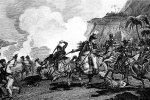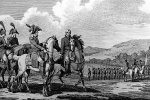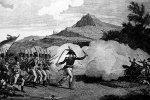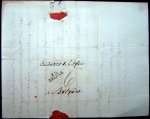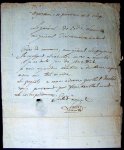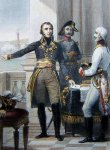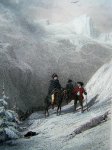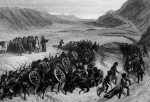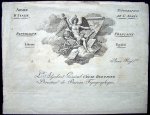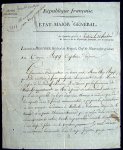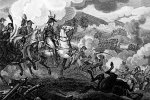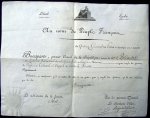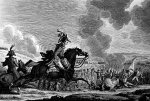Montebello
“I could hear the bones crash in my division like
hailstones beating on a window pane.”
Jean Lannes – Battle of Montebello
In October after a brief quarantine, Lannes was ordered by Bonaparte to Paris. Bonaparte would give him command of the cities infantry in preparation for the coup of the 18th of Brumaire. After the coup Bonaparte was elected First Consul, and Lannes was sent to Toulouse where he commanded the 17th military division. This would be a difficult time for Lannes and Polette, because he filed for divorce on the grounds of adultery. With war looming Bonaparte organized the Army of Reserve to confront the second coalition in Italy. Lannes was put in command of the advanced guard and arrived in Dijon on the 14th of April 1800. Once on the move they would have to cross the St. Bernard Pass in the Alps, which at this time would be a larger feat than any battle with the Austrians.
Lannes and his advanced guard moved up the narrow route covered in snow and ice in mid May. On the downhill he came into contact with few Austrians that were easily dispersed. On the 18th of May, he reached Chatillon which was secured by 1,000 Austrians. Lannes attacked in force and the Austrians retreated to the strategic location of Fort Bard. When Lannes reached the fort he could not attempt an assault due to the Austrians having the high ground. Instead Lannes marched his army during the night around the enemy positions and attacked. Out matched the Austrians quickly retreated to Ivrea. Once Lannes arrived in Ivrea he reconnoitered the enemies strength. He then decided to attack and within hours the town fell. Now the way through the Alps was open for Bonaparte and his army. Lannes went on to capture other towns held by the Austrians, and he seized a large number of arms and supplies. His next obstacle was the River Po, and after the engineers completed their pontoons, Lannes and his troops made their crossing on the 6th of June.
The next major Austrian strong point was the town of Casteggio, which was heavily fortified. When Lannes arrived on the 9th of June, he went on the attack even though he was outnumbered. After heavy fighting it seemed as though Lannes would be defeated, but Victor arrived with 6,000 infantry and the battle swung back to French. The Austrians withdrew and Lannes chased them until he reached Montebello. With his troops utterly exhausted, Lannes would hold this position until much needed reinforcements arrived. Lannes would wear the title Duke of Montebello for his actions on the 9th of June 1800. However, if Victor had not arrived to give aid to Lannes, the outcome of the action would have most certainly been different.
THE TIMES OF LONDON
September 8, 1799
ARMY OF ITALY.
To the Directory By General SUCHET, Chief of the Etat-Major of the Army of Italy.
After having, on the first day of his arrival, reconnoitred the position of the troops, and regulated their arrangements, General JOUBERT determined to try a vigorous effort to raise the blockade of Tortona, and lead the army into the plain. He had with great earnestness invited General MOREAU not to quit him until he had helped him to fight and conquer. General MOREAU was equally earnest to return this confidence, by generously agreeing to the request.
General JOUBERT, at the head of a part of the army forming the right wing, passed Savonne by the mountains of Montserrat and the Valley of Acqui, towards Capriata and Novi; while General ST. CYR, who commanded the right wing, passed by Bochetta in order to join at that point. General MOREAU and General DESSOLLES marched with this column. Some sharp engagements proceded, on the 26th and 27th (Aug. 13 and 14) the battle which was to take place between the two entire armies. On the 27th (Aug. 14) in the evening arrived at the enemy’s camp the greater part of the Austrian troops, who, until that time, had been employed in the Siege of Mantua, so prematurely surrendered. Thus in a decisive moment the Austro-Russians acquired a superiority of force which no longer left it advisable to attack them. On the 28th (Aug. 15) at the break of day, commenced the battle of Novi. The enemy attacked our left in force, and with great impetuosity. The battle was scarcely begun when General JOUBERT threw himself forward to animate by his presence a charge with bayonets. He led our soldiers on horseback, accompanied by his Etat-Major, crying out, forward! forward! when a bullet struck him on the right side, and penetrated to his heart. He fell! making no signal with his hands, and still crying out march forward! He scarcely survived an instant.
The battle was continued till evening. General MOREAU commanded; he rushed into danger, and had a horse killed under him. A bullet pierced his cloaths, and grazed his left side. The cries of his soldiers could not restrain him. Thus has perished, in the flower of his age, at the commencement of the battle, and immediately on his entry on a glorious career, this young General, the hope and prop of his country, who had deserved glory, and had already obtained a reputation well earned by his courage and his virtues. France and Italy will both feel a loss, which will indeed be felt by every friend to liberty. General MOREAU terminates his letter with the following paragraph: Our troops have performed prodigies of valour: the Russian corps has been beat; it attempted four attacks, but was constantly repulsed. The corps of General KRAY, charged with the attack on the left, was driven out of the battle in three hours. Everything promised the utmost success. General ST. CYR, PERIGNON, and GROUCHY, have particularly distinguished themselves. I am perhaps wrong to mention individuals–all did their duty. There have been few wounded, either themselves or their horses. I have been completely seconded by SUCHET and DESSOLLES.
THE TIMES OF LONDON
November 21, 1799
PROCLAMATION OF BUONAPARTE.
General BUONAPARTE has published a Proclamation to the following effect, dated the 10th inst. 11 at night: On my return to Paris, I found all the Constituted Authorities split into factions, and the Constitution one half destroyed, and unable to support Liberty. All parties hastened to meet me–entrusted me with their designs–disclosed their secrets, and asked my assistance.
I refused to become a party man. The Council of Ancients called upon me. I replied to their call. A plan of general restoration had been concerted by men whom the nation had been accustomed to behold as the defenders of liberty, equality, and property. This plan required a calm and free examination, devoid of all influence and fear. In consequence, the Council of Ancients resolved to remove the Legislative Body to St. Cloud, and charged me to make the necessary dispositions to maintain its independence. I thought it my duty to accept the command. The Councils assembled at St. Cloud; the Republican troops guaranteed safety without, but assassins spread terror within. Many Deputies, armed with stilettos and fire arms, encircled me, menacing death. I communicated my indignation and grief to the Council of Ancients. They gave me fresh testimonies of their good will and confidence.
I went to the Council of Five Hundred alone, unarmed, my head uncovered. The stilettos which threatened the Deputies were immediately lifted against their Deliverer. Twenty assassins ran towards me, and attempted to stab me. The Grenadiers of the Legislative Body few to my assistance, and one of the brave Grenadiers is struck with a stroke directed against me, which pierced his cloaths. The soldiers carried me off. At the same moment, the cry of ‘Beyond the Law’ was heard against the ‘Defender of the Laws.’ They passed forward towards the President, with threats in their mouths and arms in their hands, They ordered him to pronounce me out of the reach of the law. I was informed of it, and ordered six grenadiers to rescue him. Immediately the grenadiers of the Legislative Body cleared the Hall. The factions, intimidated, dispersed and went away. The majority returned to the Hall, heard the proposition made for the public good, deliberated, and prepared the Resolutions which were to become the new provisional law of the Republic. Frenchmen, you will no doubt behold in this conduct the zeal of the soldier of liberty, and the Citizen devoted to the Republic. The dispersion of the factions who oppressed the Councils have restored public order and security, and the men who were most odious have also shewn themselves the most contemptible.
(Signed)
BUONAPARTE
BERTHIER
THE TIMES OF LONDON
December 13, 1800
Yesterday morning we received the Paris Journals to the 10th instant, which reached Dover in a French flag of truce; bringing dispatches to Citizen OTTO, from the Minister of Marine in Paris.
They contain most important intelligence of a victory gained by the Grand Army under General MOREAU over the Austrians, on the 1st instant, in the neighbourhood of Hohenlinden. The Following is extracted from the Journal du Soir of the 9th instant: A letter from General MOREAU, dated Headquarters, Anzing, Dec. 3, gives an account of a glorious event. The severe action has been fought near Hohenlinden, in which we have taken 80 pieces of cannon, 200 waggons and 10,000 prisoners, with a great number of Officers, among whom are three Generals. The pursuit lasted till night. Our loss is estimated at 1000 killed, wounded, and taken. That of the enemy is incalculable. All have done their duty, and merit the highest praise, &c.&c. This intelligence is more fully detailed in the Moniteur of the 9th instant, which gives General MOREAU’S Letter at length, as Follows:
ARMY OF THE RHINE
MOREAU, GENERAL IN CHIEF, TO THE MINISTER OF WAR.
Head-quarters at Anzing,
12 Frimiare(Dec. 3d).
I have the pleasure of giving you an account, my dear General, of the most glorious action for the army which I command, and of the greatest advantage for the Republic. By my dispatch of yesterday, in giving you an account of the battle of the 10th, (1st Dec.). I announced the concentrating of the army, and of my plans to commence offensive operations. Yesterday the corps under General GRENIER collected between Hohenlinden and Hartopsen, while General GROUCHY extended his left to the village of Hohenlinden, and the divisions of RICHEPANSE and DECAN to Ebersberg. Expecting to be attacked by the enemy at Hohenlinden, I gave orders to General RICHEPANSE and DECAN to advance by St. Christopher upon Matenpoet, and to fall upon the rear of the enemy. This movement was executed with the greatest intrepidity and talent. The enemy commenced this attack upon Hohenlinden at half past seven in the morning. It was at this moment I judged it expedient that the attack should be commenced by General RICHEPANSE. I ordered General GRENIER to commence at the same time. General NEY rushed vigorously into the defiles, and half way to Matenpoet, formed a junction with General RICHEPANSE. All those who were in the forests, comprising about a league and a half, were killed, taken, or dispersed. The attack of General NEY was well supported by the division of General GROUCHY, which fell upon the reserve of the enemy’s grenadiers, who had attempted to flank us on the right. Those attacks were directed by General GRANDJEAN and BOYER.
The movements of General RICHEPANSE and DECAN met with the greatest obstacles. Obliged to march by the roads surrounded with the enemy, General RICHEPANSE, with five or six battalions of infantry, and one regiment of chasseurs, found himself separated from the other divisions, and without regarding those he had left behind him, marched up in the center of the enemy, not at all discomposed, with only a few troops with him, and united himself with the head of the division, which was conducted with equal intrepidity by the Adjutant Commandant RUFFIN. General VALLER was dangerously wounded; General DECAN was prevented from supporting General RICHEPANSE.
During these complete successes in the centre, a column advancing from Vasserburg upon Ebersburg, obliged General DECAN to change his position from the van to the right to arrest the progress. He charged and routed them with the greatest disorder. The battle appeared completely decided by three o’clock; but another corps coming from the Lower Inn, attempted to penetrate by Burtrain Le Hohenlinden, with the intention of making a diversion upon the left. The enemy having a number of troops stationed in the valley of the Issen, Lieutenant-General GRENIER left his position. The divisions of LEGRAND, BASTOUT and the reserve of cavalry, which were about to act on the offensive, were now attacked; a number of troops from NEY’S and other divisions on the right were sent to support them. Generals LEGRAND and BASTOUT, after having repulsed these attacks, charged with the greatest vigour. The enemy, after a number of efforts, were routed with the loss of a great part of their artillery. General BASTOUT being wounded, was replaced by General BONNET.
This was a general battle, as there was not a corps in the French army which was not engaged, and the same with the Austrians. There was much snow during the battle. We have taken 80 pieces of cannon, 200 caissons, 10,000 prisoners, a great number of Officers, among whom are three Generals. The pursuit continued till night. Our loss consists in one thousand men, killed, wounded, and missing; the loss of the Enemy is incalculable. All did their duty; I cannot pay any particular eulogies to one more than to another. Artillery, Infantry, and Cavalry, all deserve praise. The Officers of the Etat-Major particularly distinguished themselves. The corps of General LECOURBE, which on the 10th had taken possession of Rosenheim was ordered to cover the Inn, and to defend all passes of the Tyrol. The Chief of the Etat-Major will send you a detailed account of the battle of Hohenlinden, which place is well known for the Convention which ceded to us the three fortresses. The Republic ought to know such of the Army who have distinguished themselves. The Chief of Staff will also inform you of the different detachments of the enemy; to which at present we can pay no attention. Our army is elated with its success, and hopes that it will attribute to accelerate a peace.
(Signed)
MOREAU
“Washington is dead. That great man fought against despotism.
He established the liberty of his country. His memory will always
be treasured by the French people, as it will by the free men of
both continents, and especially by the French soldiers who, like
him and the American soldiers, are fighting for equality and
liberty. The First Consul therefore orders that, for the space of
ten days, a black crape shall be draped on the standards
and guidons of the Republic.”
Order by Bonaparte, February 7
THE TIMES OF LONDON
May 22, 1800
ARMY OF ITALY.
Nice, April 30.
THE GENERAL OF DIVISION COMMANDING THE 8TH MILITARY DIVISION TO THE FIRST CONSUL.
Head-Quarters at Marseilles, 16 Floreal(May 16), Citizen Consul.
The news which I have received from the army, dated the 3d, informs me that the General in Chief MASSENA defends himself like a lion at Genoa; that the enemy dare not block him in except by distant positions. He has made a sortie, and killed 800 Austrians, and made 1200 prisoners. Five ships laden with grain have arrived at Genoa, and other small vessels laden with grain are daily arriving there. The General in Chief has answered a flag of truce sent by the enemy, that while he had an ounce of bread, and a drop of blood in his veins, he would fight; and that he would sooner bury himself in the ruins of the city, than abandon Genoa to the enemy. The Lingurians perform wonders and fight with bravery. General DESAIX, Citizen POUSSIELGUE, and 130 Officers of the Army of Egypt, have arrived at the Lazaretto of Toulon.
Health and respect,
(Signed)
SAINT HILAIRE
THE TIMES OF LONDON
June 4, 1800
BULLETIN OF THE ARMY OF RESERVE
Aosta, May 24.
On the 16th, the advanced Guard, commanded by General LANNES, passed by the St. Bernard, and proceeded to Aosta. A Hungarian battalion attempted to defend the entrance to the city; it was, however, repulsed, and had some men killed. On the 17th, General LANNES proceeded to Chatillon. The enemy endeavoured to defend the passage of a bridge; but they were beaten by the grenadiers, who took 300 prisoners, and killed 100 men. Three pieces of cannon were taken, together with four ammunition waggons.
The army passed through St. Bernard on the 17th, 18th, 19th, and 20th. On the 16th, the division of General CHABREAU passed through Little St. Bernard. The chief difficulty consisted in the transport of the artillery. St. Bernard was covered with snow, and the ascent was very steep; but General MARMONT adopted the most effectual means of conquering those difficulties. The light companies, and some of the line, passed through on the 21st. They were two days in completing their passage, not wishing to leave their artillery behind them. In the most difficult passes, the troops encouraged each other to fresh exertions. The FIRST CONSUL descended from the top of St. Bernard, after having passed over the snow in sledges, traversed precipices, and glided over torrents.
On the 18th, the General in Chief, BERTHIER, surrounded the Castle of Bard, took possession of the heights of Alvaredo which command it, and summoned the Commandant to surrender, who, however, refused to comply. On the 22nd, he took possession of the whole of the lower part of the castle. Four companies of grenadiers entered it in the night, and let down the drawbridges. The enemy retired to the turrets, and other places on the rock of Bard. On the 22nd, the advanced guard engaged the enemy which defended the entrance of the pass leading to St. Martin, drove them back, and made 50 prisoners. On the same day, BERTHIER having made the division of BOUDET to advance, in order to support the advancing guard, ordered him to take possession of Ivre. The enemy had a garrison, in the citadel, and appeared desirous of defending the city, but had vey few people to make any resistance. General LANNES repaired thither on the 23rd, and took possession of the city and the citadel by assault. Ten pieces cannon were found. He pursued the enemy, who retreated to Turin, and made 400 prisoners. In all those actions we had only 7 men killed and 25 wounded. On the 24th the FIRST CONSUL was informed , at the head-quarters at Aosta, that MASSENA had lately made a successful sortie from Genoa.
THE TIMES OF LONDON
June 12, 1800
Extract of a Letter Written from Aosta.
May 26.
The FIRST CONSUL is at Verrex. You have heard that LANNES has taken Yvrea. We expect to hear tomorrow of the descent of MONCEY by St. Gothard with 20,000 men. All the avenues to Italy are covered with our cannon and soldiers. The devotion of the latter is sublime, and to form any idea of it, it is necessary to see them.
THE TIMES OF LONDON
JUNE 12, 1800
CAPTURE OF SUSA AND LA BRUNETTE.
Extract of a Letter from General BERTHIER.
May 26.
While the advanced guard, commanded by General LANNES, pushed forward towards the Po and Chivasso, the division under General THUREAU attacked the enemy at Suza. On the 22nd he attacked the post of Gravieres, the heights of which were planted with cannon, and surrounded with intrenchments.
The Adjutant General LIEBAU, commanding the advanced guard, marched with 800 men of the 28th light, and 150 of the 15th, to carry by assault all the works. General THUREAU supported this attack with three companies of carabineers, four of grenadiers, one howitzer, and one 8 pounder. The engagement was obstinate, and victory long doubtful. A battalion of the 26th succeeded in turning the fort of St. Francis. They immediately took it, established themselves on the height, and compelled the enemy to evacuate the village of Gravieres. Soon after the troops advanced on all sides at the charging step, the positions were forced, and LA BRUNETTE capitulated at ten in the evening. In this engagement we took more than 1,500 prisoners, killed or wounded 300, and took 800 muskets, and a great quantity of provisions and ammunition. On our side we have had 60 men killed, and 250 wounded. After this victory, General THUREAU advanced on Suza. I ordered the Italian legion to march towards Greponet and Riva. The descended the Sefia, and followed the movements of the army. General MURAT, on his part, entered Vercelli by storm on the 27th. The 2d and 15th regiments of chasseurs, supported by three companies of MONNIER’S division, have routed on the Sefia 1,000 of the enemy’s cavalry, 60 of whom, with their horses, have been taken. Aide-de-Camp BEAUMONT had a horse killed under him during this engagement. The enemy burnt their bridge on the Sefia. General MURAT has constructed another. The advanced guard is in the front of Chivasso.
(Signed)
ALEX. BERTHIER
THE TIMES OF LONDON
June 12, 1800
BULLETIN OF THE ARMY OF RESERVE
Vercelli, May 30.
The advanced guard remained the of the 29th at Chivasso. The enemy being informed that we had collected boats on the Po, conceived that we intended to pass it at Chivasso, in order to advance to Asti, and intercept the corps of troops returning from Nice.
They, consequently, made all the disposable infantry on the right bank of the Po file off from Turin, to the point opposite to Chivasso. In the mean time, General MURAT had completed his bride on the Sesia, passed that river, proceeded towards Novarre, and took a position along the right bank of the Ticino. The CHIEF CONSUL arrived this morning at Vercelli. It would be difficult to describe the joy of the Italians at being delivered from the Austrian tyranny. All the divisions of the army are in full march, and will tomorrow pass the Sesia. General LANNES has this night passed the Doreabaltea, and marches towards Vercelli by Crescentino and Trino. The Austrians had celebrated the taking of Nice in the most pompous manner, through all the towns of Italy. They were not aware that it would prove so fatal to them. They are in the utmost consternation. The inhabitants of Milan must have today heard the cannon of our advanced posts. We are assured that MELAS had, as late even as today, his head quarters at Turin.
THE TIMES OF LONDON
June 12, 1800
BULLETIN OF THE ARMY OF RESERVE
Novarra, June 1.
General MURAT entered Novarra on the 30th, and immediately advanced towards the Ticino. The Italian legion moved forward from Romagnano, in an opposite direction to Sesto. General DUHESME, with the divisions under his orders, took a position along the Tecino. The FIRST CONSUL arrived on the 31st on the banks of the Tecino, and in the evening made a very military shew of cavalry, and some pieces of cannon on the opposite side.
General MURAT caused a battery to be erected, and the cannonading was instantly commenced, which lasted for an hour. The enemy had withdrawn all the boats they could find to the left side, but the inhabitants of the village of Galiati concealed five or six, which they offered to the army. We made use of them to transport into an island some companies of grenadiers, which obliged the enemy to evacuate the point of the left bank, at which place we wished to effect a passage. In the course of six hours we had on the other side nearly 1,500 men, and two pieces of cannon. General MONNIER possessed himself of an advantageous position along the Naviglio Grande, and the enemy seeing our passage effected, fell back on every side, on Turbigo. Several of the Austrian Generals arrived there about the evening. The different charges of cavalry attempted by the enemy completely failed, and Adjutant General GIZARD gained immortal honour. At eight o’clock in the evening General MONNIER attacked the village of Turbigo, and made himself master of it, after an obstinate action. Two hundred Imperialists were taken prisoners. The village was at length surrounded, and every man found in it was massacred. Above three hundred dead bodies were found, mostly belonging to the cavalry. In the mean time, General DUHESME, having procured a small boat, sent over to Bassalora some companies of carabineers. General THUREAU had, for five days successively, in the beginning of the present decade, several hard fought actions to sustain with the enemy, and kept at bay a considerable number of troops. He continues to carry on his manoeuvres between Suza and Turin. According to the last letters received from Nice it apperas that MELAS did not leave that place till the 21st of May; and that on the 23d the enemy having attempted to carry the bridge of St. Laurent of the Var was vigorously repulsed. We are now crossing the Tecino with all possible dispatch. General MURAT is with the advanced guard, at three leagues from Milan.
THE TIMES OF LONDON
June 19, 1800
BULLETIN OF THE ARMY OF RESERVE
Milan, June 3.
General MURAT entered Milan on the on the 24 inst. and immediately caused the citadel to be surrounded. In three hours after, the FIRST CONSUL, and the whole of the staff, entered the city, amidst a populace animated by the greatest enthusiasm. The horrors which were committed by the agents of the Emperor at Milan are without example. Neither sex, age, nor talents were spared.
General MONCEY has passed St. Gothard, and is expected tomorrow at Vareze. The Division of General LANNES had composed the advanced guard, from St. Bernard to Ivree, and advanced as far as Chivasso, for the purpose of making the enemy believe that our design was to form a junction with General THUREAU, who was between Rivoli and Suza. In the mean time, the army filed off in another direction, and passed by Sesia and Tesin. General LANNES was then ordered to go to Pavia, which he entered this morning, and has found in it considerable magazines of provisions, an immense quantity of powder, 1,000 Austrians, sick and wounded, 500 pieces of cannon and carriages, powder magazines, balls, &c. General LECHI has passed to Castano with the Cisalpine Legion. General DUHESME with the corps under his command, is marching to Lodi. The march to Milan was son rapid, that the people of that city, until 24 hours before the entry of the French into it, did not know that they were in Italy. The fort of Bard has been attacked, and obliged to capitulate. There were 18 pieces of cannon found there. The garrison, consisting of 400 men, were made prisoners of war, and sent to France.
THE TIMES OF LONDON
June 19, 1800
BULLETIN OF THE ARMY OF RESERVE
Milan, June 5.
General BERTHIER has caused Pizzighitoni to be invested by the corps of General DUHESME, and has caused Cremona to be taken possession of. The FIRST CONSUL assembled all the Bishops and Curates, and informed them of his intention to maintain the religious organization such as it was when he commanded at Milan. He caused them to give assurances of fidelity. The enemy did not begin to evacuate the ports of Nice till the 29th ult.
THE TIMES OF LONDON
June 19, 1800
BULLETIN OF THE ARMY OF RESERVE
Milan, June 7.
General LOISON, after having passed the Adda at Lodi, took possession of Cremona, passed the Oglio on the 5th, and took possession of Orsi Novo, a place of some strength, between Brescia and the Po. After having pursued the enemy along the road of Brescia, General LOISON proceeded by a counter march to Cremona, for the purpose of seizing the numerous magazines which the enemy had in that place, of passing the Po there, and of joining the corps of MURAT, which is at Placentia.
On the 5th, General MURAT advanced towards Placentia. The enemy defended the head of the bridge with a great quantity of Artillery. It was taken possession by MURAT, at 11 o’clock in the night, and 100 men, who remained to guard the passage, were made prisoners. We have taken possession of every bridge on the Po, except two or three on the side of Placentia, which the enemy had time to destroy. On the 6th, at four in the morning General LANNES occupied the celebrated position of Stradella, and thus cut off the only means which the enemy had in making their communications. The enemy feeling the importance of this position, united their several posts, and attacked General LANNES with the greatest impetuosity. The 28th demi-brigade has been covered with glory; the enemy was put to the rout, leaving 200 dead, 300 prisoners, as many wounded, and some waggons. They have retreated to Placentia. A great part of the French Army will be united tomorrow at Stradella. No other resource remains for MELAS but a battle; he has no means of retreating except through Tortona or Alessandria.
THE TIMES OF LONDON
June 19, 1800
BULLETIN OF THE ARMY OF RESERVE
June 8.
General LOISON has proceeded to Brescia. The Cisalpine Legion, commanded by General LECHI, took possession of the flotilla, which the enemy had on the Laco Majore, passed the Adda at Lecco, went to Bergamo, and took 50 prisoners, and 4 pieces of cannon. A corps of the enemy, in attempting to enter the Castle of Placentia this day, was surrounded and taken. General MURAT has intercepted a courier from MELAS with very important dispatches; and took more than 2,000 prisoners at Placentia. The dispatches of General MELAS to the Court of Vienna announce, that at the moment when the order arrived for General OTT to raise the blockade, General MASSENA sent a message offering to capitulate. It appears from the letter of General MELAS, that MASSENA has given up Genoa, but that his army have not been made prisoners of war. General ELNITZ, who evacuated Nice, has not been able to effect his retreat by the Collo di Tende. By the intercepted letters of General MELAS, it appears that Alessandria is badly provisioned. It is thought that General MELAS will take shelter in Genoa, if the first events are unfavourable to him.
THE TIMES OF LONDON
June 19, 1800
BULLETIN OF THE ARMY OF RESERVE
June 9.
General DUHESME has occupied Cremona, where he found considerable magazines. General ELNITZ has been considerably harassed in his retreat by General SUCHET, who on the 2d and 3d took fifteen hundred prisoners. General GORROUP has lost his artillery, and retired with very few men to Coni, the command of which place he has taken. General SUCHET was to form a junction with the army that was in Genoa, on the side of Albenga.
THE TIMES OF LONDON
June 25, 1800
Army of Reserve.
Alexander Berthier, General in Chief of the Army, To the Chief Consul.
Head Quarters at Bronni, June 9.
I have the honour to inform you, on learning that General OTT had set out from Genoa with 30 battalions, and that he had yesterday reached Voghera. I ordered General LANNES to march from the position of Bronni, and to attack the enemy wherever he should come up with them, and I ordered General VICTOR to support him with his corps.
General WATRIN me the out-posts of the enemy at San Diletto. The main body of the enemy occupied Casteggio and the heights to the right. His position was defended by artillery and a force of 15,000 men. The 28th demi-brigade, the 6th, 22d, and 40th, after forcing the enemy’s advanced guard, endeavoured to turn the right of their front line. The enemy obstinately maintained their position. Never was there warmer conflict. The corps made repeated charges in their turn. A battalion of the 40th, by falling back for a moment, gave some advantages to the enemy. At that instant General VICTOR made the division of Chambarlac advance. The 24th attacked the enemy’s left; the 43d, with whom General VICTOR was, attacked the heights on the left, while the 96th pierced the enemy’s centre, defeated it, and decided the victory. The village of Casteggio was taken and retaken several times, as likewise were several other positions. The brave 12th regiment of hussars, who singly opposed the whole of the enemy’s cavalry, performed prodigies. The enemy were pursued as far as Voghera. The result of this engagement has given us 6,000 prisoners and 5 pieces of cannon, with their ammunition waggons. The enemy have had more than 3,000 men killed or wounded. About 500 have been killed or wounded on our side; among whom is the Chief of the 22d demi-brigade, and my Aide-de-Camp LABORDE, who has received a slight wound on his head. I shall lay before you the names of those brave men who have particularly distinguished themselves. All the corps are entitled to praise.
(Signed)
ALEX BERTHIER
THE TIMES OF LONDON
June 25, 1800
BULLETIN OF THE ARMY OF RESERVE
Stradella, June 10.
On the 9th, the CHIEF CONSUL left Milan, in order to proceed to Pavia. Having remained there one hour only, he mounted his horse and crossed the Po to join the advanced guard, which was already engaged with the enemy.
General OTT reached Voghera from Genoa by three forced marches with a corps of 15,000 men, who had blockaded that city. He was reinforced by a corps of 4 or 5,000 men, who had been appointed by General MELAS to defend the passage of the Po. The advanced guard of this army, and that of the French army, joined battle about noon. The enemy occupied the height in front of Casteggio. The contest continued with the most determined obstinacy during the whole day. General VICTOR led on the division of Chambarlac in the most fortunate manner. The 96th, by a charge of the bayonet, decided the success of the battle, which was hitherto uncertain. The enemy left 3,000 in killed or wounded, 6,000 prisoners and 5 pieces of cannon. They were completely routed. The 12th of hussars are covered with glory. We had 600 killed or wounded. It appears that General MELAS has evacuated Turin, and concentrated all his forces at Alessandria. The enemy have been pursued beyond Montebello. General WATRIN has displayed talents and a degree of enthusiasm which transport the troops. The battle of Montebello has affected the partisans of Austria with terror and dismay. They discover that the events which have taken place have no longer for their subject the preservation of Italy, but that of cutting off the retreat of the Austrian army. One of the enemy’s Generals has been killed, and several of them have been wounded. The General in Chief, MASSENA, after forming a junction with SUCHET, was to have been at Oneglia on the 5th, whence he will soon penetrate into Piedmont.
Sources
THE EMPEROR’S FRIEND – MARSHAL JEAN LANNES
by Margaret Scott Chrisawn
IN THE WORDS OF NAPOLEON – The Emperor Day by Day
Edited by R. M. Johnston – New Material by Philip J. Haythornthwaite
FASTES DE LA NATION FRANCAISE – 1825 Edition
by Ternisien D’Haudricourt
